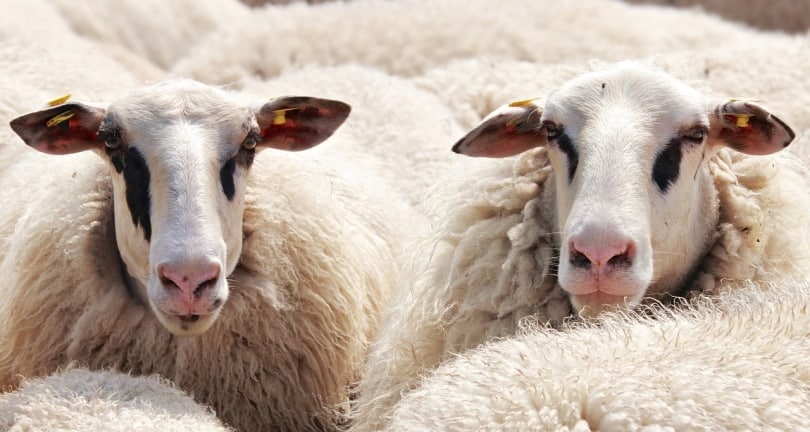Relax and laid back with their signature “baaa”, sheep have been one of the most common animals that can be found in farms. Sheep are non-aggressive, docile creatures that are known for their fluffy white coat of wool. Whenever you spot a sheep, they can often be found chewing on grass.
Sheep are herbivorous, so their diet consists mostly of grass. But other than grass, what do these gentle creatures actually eat?

What Do Sheep Eat?
Sheep are ruminants, meaning they have multiple chambers in their stomach that allows for more absorption of nutrition by fermenting the plants they eat before digesting it. After storing the food for fermentation, they regurgitate and re-chew it before ultimately swallowing it again for digestion.
Sheep are herbivorous mammals, so their diet is limited to plant-based food sources. This includes grass, legumes, and other plants.
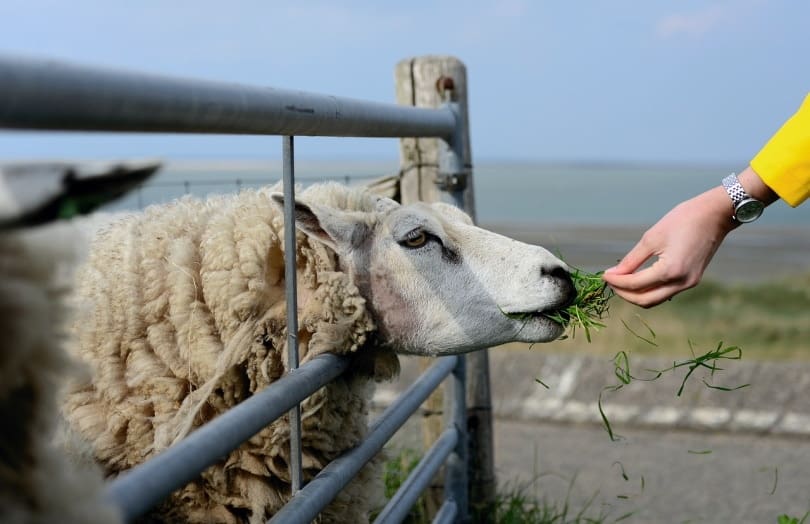
In the Wild
Sheep can normally be found in extreme climates where other mammals may struggle. Most sheep find their natural habitat in steep, upland areas, or mountainous habitat where their sheepskin is put to good use due the colder weather. There are some species of sheep such as the Barbados Blackberry that thrive in a warmer, tropical climate compared to most of their counterparts.
As herbivores, sheep contribute to their environment by grazing fields which controls the growth of local vegetative species. With their hooves, they also break up the soil when they walk which promotes soil health and plant growth, as well as the soil’s ability to absorb water. By living in areas rich in plant-life, sheep can contribute to the ecosystem just by walking on and eating plants!

Sheep in Domestication
Should you decide to own and domesticate sheep, knowing that they are plant-eaters is not enough. It is also important to familiarize yourself with the different types of plant-based foods to ensure your sheep has a balanced diet.
1. Grass Diet
A sheep’s diet mainly consists of grass, along with clovers, forb, legumes, and other pasture plants. Grass is a sheep’s main food supply as their tongue and teeth are designed to graze on short grass. They may graze the fields for hours, up to 7–8 hours in a day just eating grass!
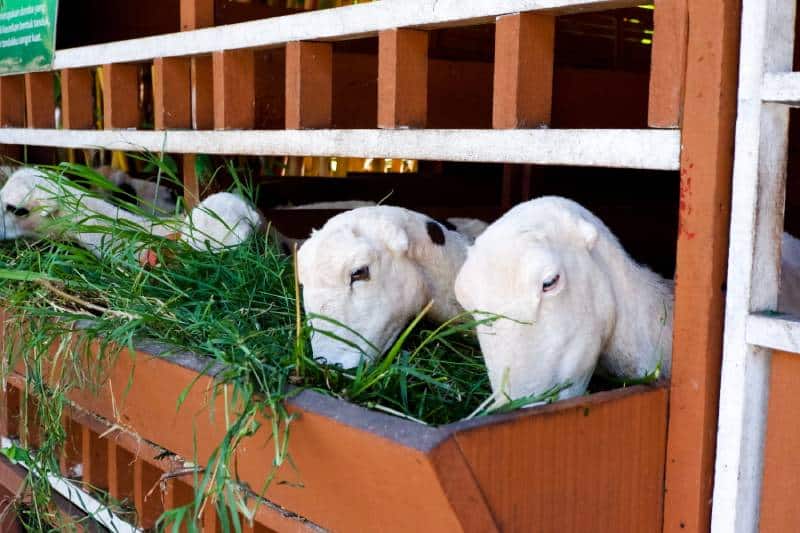
2. Plants
Aside from grass, sheep also eat different types of plants. Sheep are picky eaters, they always find a way to adapt to their environment, familiarizing themselves where different plants grow in the area. They will eat anything of nutritional value and will choose plants with fibrous stalks or nutritional growth before moving to other sources that they can find. It is important to avoid toxic plants as these may affect the sheep’s health, that is why it is important to be familiar with the different vegetation growing in your pasture.
Some plants that they enjoy are legumes, which are plants that grow pods with seeds in it and are high in nutrients, as well as forbs, which are broad-leaf plants.
3. Grazing
As mentioned earlier, sheep can graze for up to 7–8 hours in a day. If left unmonitored, the overall health of the pasture can be affected which would lead to difficulty for plants to grow and for sheep to feed. Pasture rotation is very important to ensure that the vegetation in the pasture is healthy and nutritious, and that the quality of soil remains top-notch.
Sheep will also explore the different plants within the area they graze. They may try the odd-looking plants to see if they like it or not. Because of this, it is important to ensure that your field is clean and with no trash around, like plastic, as your sheep may mistake them for food.
Knowing the size of the pasture needed for a flock of sheep would depend on the climate or environment, including the weather and the amount of rainfall that the pasture receives. For example, a field in a dry climate may only be able to accommodate a small population of sheep compared to a field of the same size in an environment that gets adequate rainfall.
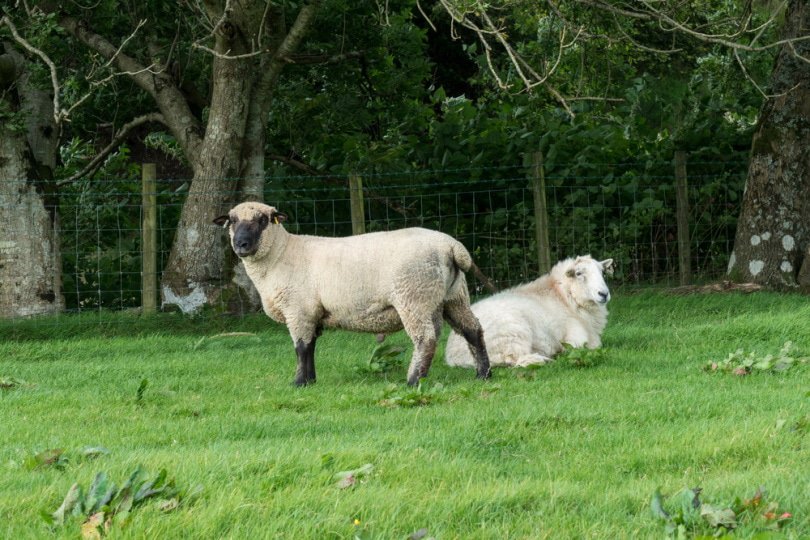
- Related Read: 12 Popular Types of Sheep Breeds (with Pictures)
4. Grass Alternatives
What about during times where fresh forage is unavailable? With different seasonal changes, there will be times that fresh forage will be unable for sheep to munch on. When these times come, there are different plant-based foods alternative to grass that you can feed your sheep.
Stored Foods
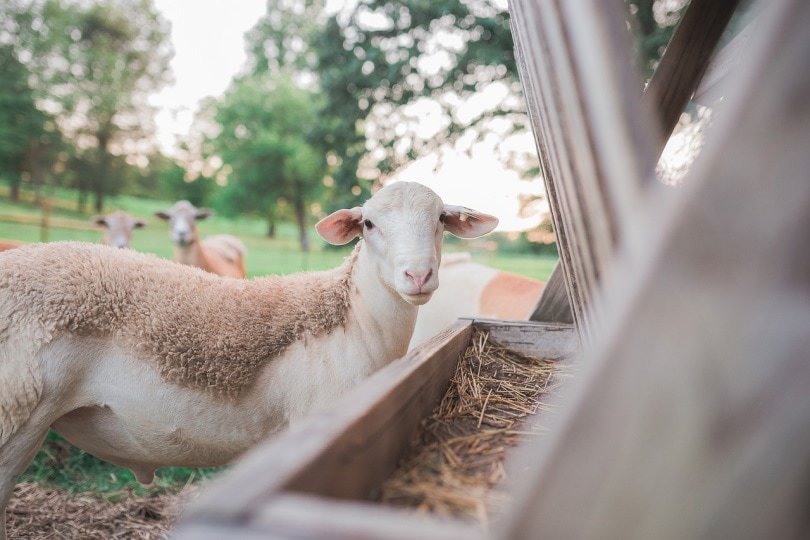
Sheep are typically fed stored food, most common among these are hay and silage. Hay is simply dried grass that is cut up, and silage is fermented green forage. Hay can simply be kept outdoors, but silage must be kept in silos to keep the air out that may cause molding.
Different pasture plants that are cut, chopped up, and fed in feedlots are also common when grass in inaccessible. They also enjoy fruits and vegetables such as carrots, lettuce, apples, oranges, grapes, etc.
Grains
Grains and supplements are given to sheep that require higher nutritional needs such as pregnant ewes and ewes that are nursing lambs. Different grains include corn, barley, and wheat are high in vitamins and minerals. Soybeans are also added when feeding grain as a protein source.
Sheep enjoy the taste of grain, but the amount of grain being fed must be limited as these can cause digestive problems in sheep.
By-Products
By-products from production of crops and foods can also be given to sheep as this limits the amount of waste and are also nutritious to the sheep. Examples of these by-products would include soybean and peanut hulls. Leftover fruits and vegetables can also be given to sheep.
By-products from distillers’ grains have also been popular and economical foods for sheep. Although the leftover solids from the production of ethanol can contain high levels of phosphorus and sulfur, the amount of distillery by-product must be managed when being fed to sheep.
Water
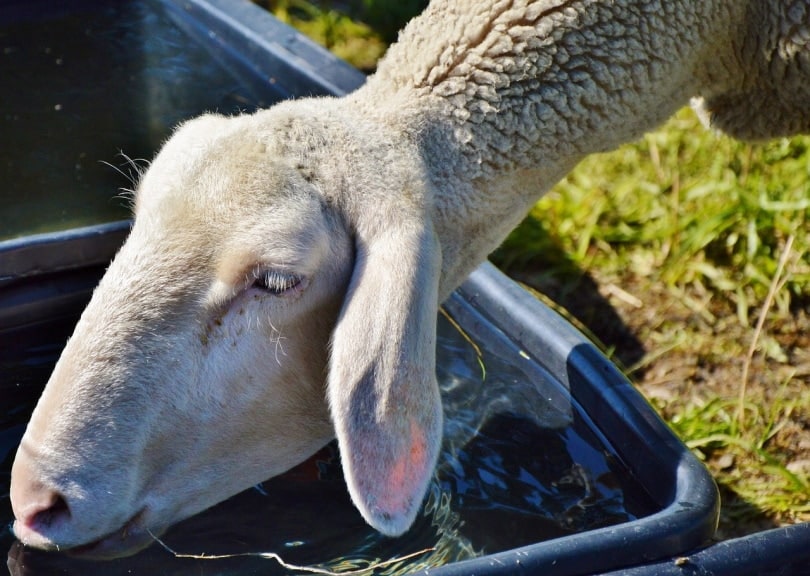
Water is also essential in a sheep’s diet. On average, a sheep can consume 1–2 gallons a day. It is important to be familiar with your sheep and your environment as different factors such as ewe pregnancy, increase in temperature of the weather, and consumption of hay will increase the water requirements of your sheep.
Related Read:

Final Thoughts
Sheep are simple yet interesting creatures and have a very big contribution to the ecosystem. If we decide to farm them and harvest their wool, it is only right that we give them the necessary greens that these herbivores know and love so much!
- You may also be interested in: Are There Wild Sheep in Nature? Where Can They Be Found?
Featured Image Credit by pixel2013, Pixabay
